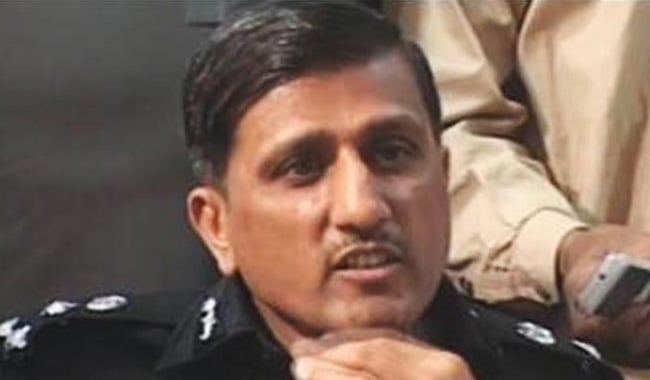‘Winning hearts and minds is more important than killing them’
Sindh’s top counterterrorism official recently delivered a lecture at a private university, where he explained to the students what narratives to use to counter violence and extremism.
“Winning hearts and minds is more important than killing hearts and minds,” the Counter Terrorism Department’s (CTD) provincial chief, Additional Inspector General of Police Dr Sanaullah Abbasi, later told The News.
Therefore, he said, soft options must precede or succeed hard options. “Hard are tactical, but soft are strategically important,” added Dr Abbasi, who also holds a PhD in law.
“Reactive to symptoms and proactive to causes, we need both approaches to the curse of violent extremism. Comprehensive and durable solutions are hard to conceptualise, much less implement, and in the meantime, our social fabric is stretched thin.”
He said there are at least four factors that contribute to the widening of identity-based schisms in our societies. Acknowledging and addressing them can make a modest contribution towards developing our collective counter-narrative, he added.
Constructive conflict
Absence of conflict is not harmony, said the CTD chief, it is apathy. “It is also apparent that harmony built on the avoidance of conflict gives a false sense of security, which breaks down precisely when we need it.”
He said that a general lack of literacy in how to conduct conflict constructively or how to resist political exploitation of differences contributes to flare-ups. “Constructive conflict can be an acquired skill for children and adults. It is a trainable art.”
Beyond tolerance
Passive tolerance among segregated communities does not create social resilience, said Dr Abbasi. “We need to recognise diversity as a virtue and pursue plurality, proactively and deliberately. Little things matter.”
He added: “We all have unconscious biases that can subtly manifest themselves in our choice of words, labels and careless generalisations. When these are repeated on public platforms and are greeted with indifference, they can shape norms of what is acceptable. The silent majority gives tacit consent to threads that lead to more extreme extensions.”
The binary trap
The CTD chief also talked about the Westminster debate on whether or not to launch air strikes in Syria. “There was great oratory and passion on both sides: the argument for degrading terrorist capabilities on the one hand against the long-term efficacy of such actions on the other.”
However, he said, they were like ships sailing past each other and no one asked how we can achieve both. “Much of the public discourse, perhaps egged on by the media, is framed as false binaries with opinion lazily clustered around a one-dimensional spectrum. The echo chamber gets entrenched at each pole and soon ‘you are either with us or against us’.”
What can we do?
Extremist ideology is derived from a complex mix of seemingly intractable issues such as economic deprivation, historical baggage or political instigation, said Dr Abbasi. “It needs coordination and public-private partnership of the highest order.”
He added: “It is easy to get bogged down by its complexity and wait for the authorities to do something. Alternatively, each one of us can play our part.”
Firstly, he elaborated, by adopting the rules of constructive conflict in our own interactions, we help make the terrain less incendiary. “Secondly, by joining the initiative for constructive conflict and diversity, we can help immunise communities against prejudicial conflict.”
Interventions, said the CTD chief, can take the form of diversity training in schools to affirmation workshops with adults, all the while emphasising the need for cross-group integration. “The use of cultural arts and entertainment is also a potent way to spread the word.”
-
 Halsey's Fiance Avan Jogia Shares Rare Update On Wedding Planning
Halsey's Fiance Avan Jogia Shares Rare Update On Wedding Planning -
 Instagram Head Adam Mosseri Says Users Cannot Be Clinically Addicted To App
Instagram Head Adam Mosseri Says Users Cannot Be Clinically Addicted To App -
 James Van Der Beek Was Working On THIS Secret Project Before Death
James Van Der Beek Was Working On THIS Secret Project Before Death -
 Las Vegas Father Shoots Daughter's Boyfriend, Then Calls Police Himself
Las Vegas Father Shoots Daughter's Boyfriend, Then Calls Police Himself -
 'Hunger Games' Star Jena Malone Shocks Fans With Huge Announcement
'Hunger Games' Star Jena Malone Shocks Fans With Huge Announcement -
 Ex-OpenAI Researcher Quits Over ChatGPT Ads
Ex-OpenAI Researcher Quits Over ChatGPT Ads -
 Prince William Criticized Over Indirect Epstein Connection
Prince William Criticized Over Indirect Epstein Connection -
 'Finding Her Edge' Creator Explains Likeness Between Show And Jane Austin Novel
'Finding Her Edge' Creator Explains Likeness Between Show And Jane Austin Novel -
 Margot Robbie Delivers Sweet Message Ahead Of Valentine's Day
Margot Robbie Delivers Sweet Message Ahead Of Valentine's Day -
 How AI Boyfriends Are Winning Hearts In China: Details Might Surprise You
How AI Boyfriends Are Winning Hearts In China: Details Might Surprise You -
 Blake Lively Mocked Over 'dragons' After Latest Court Appearance
Blake Lively Mocked Over 'dragons' After Latest Court Appearance -
 Gmail For Android Now Lets Users Create Labels On Mobile
Gmail For Android Now Lets Users Create Labels On Mobile -
 Emma Slater Reveals Final Moments With James Van Der Beek Before His Death
Emma Slater Reveals Final Moments With James Van Der Beek Before His Death -
 Princess Kate Makes Surprise Visit To Support Mental Health Initiative
Princess Kate Makes Surprise Visit To Support Mental Health Initiative -
 Reese Witherspoon Sparks Nostalgia With 'Green Sisters' Tribute To Jennifer Aniston
Reese Witherspoon Sparks Nostalgia With 'Green Sisters' Tribute To Jennifer Aniston -
 Royal Family Faces Fresh Crisis While Andrew's Controversy Refuses To Die
Royal Family Faces Fresh Crisis While Andrew's Controversy Refuses To Die




